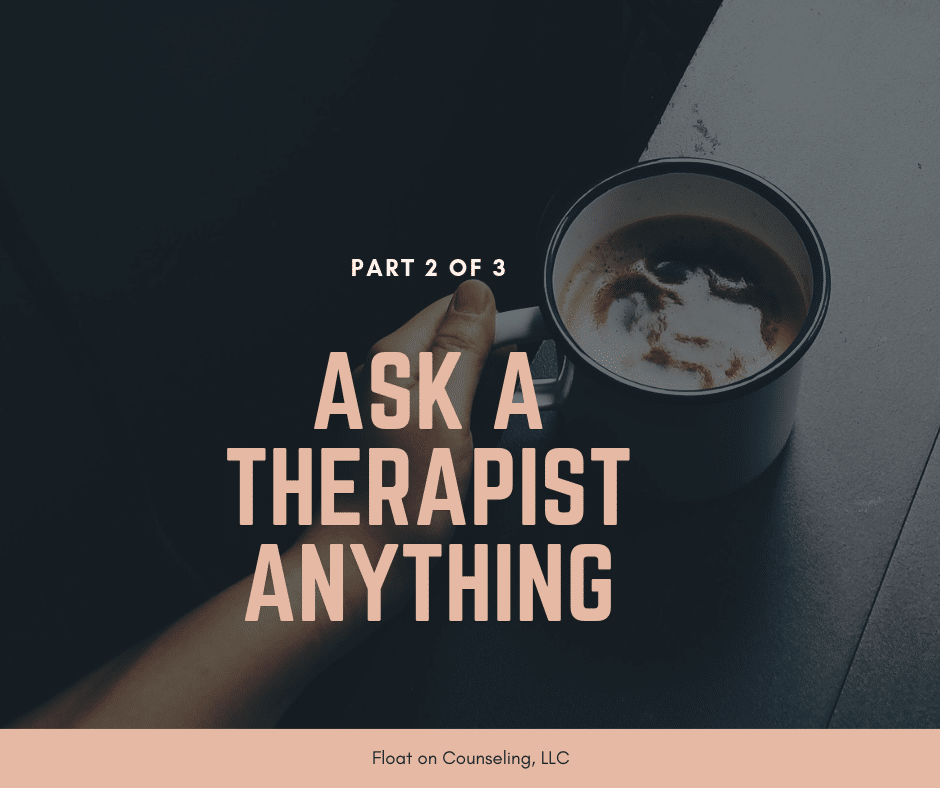This is part 2 of 3 in my “Ask a Therapist Anything” Series. Here, I answer questions about the difference between a Therapist and Counselor, how many sessions the average person needs, why I don’t take insurance, and how as a male Therapist I feel about my ability to work with females.
If you missed part 1, check out Part 1 of 3 – Ask a Therapist Anything.
4 – “Is a Therapist the same thing as a Counselor?” – The words “Counselor” and “Therapist” are used interchangeably and usually depend on personal preference. Both terms can cause some confusion as there are different types of Counselors and Therapists. Think Physical Therapist, Occupational Therapist, Camp Counselor, or School Counselor. For the purpose of the kind of work I do, a Therapist or a Counselor is someone who has a Master’s degree or higher in Psychology, Counseling, or Social Work and who has a License (or who is working towards a License) in their field. Different types of Licensed Therapists or Counselors in Florida include: Licensed Mental Health Counselor, Licensed Marriage and Family Therapist, Licensed Clinical Social Worker, and Licensed Psychologist (Doctorate-level). I am a Licensed Mental Health Counselor. Different states have different titles and may refer to a Licensed Counselor as a “Licensed Professional Counselor (LPC)” or other. As a side note, many mental health agencies/organizations also employ Intern Counselors/Therapists who are either students still working towards a graduate degree or Counselors who have training/certification in a specific area, like addictions.
5 – “How many sessions does an average person go through? Does it vary based on what they are ‘stuck’ on?” – The number of sessions a client might attend before they stop going to therapy does vary widely from person-to-person. Some people go to therapy briefly for an immediate/short-term issue that only requires a few sessions. Others have deeper work to do and may stay in Therapy for several months or longer. Even if there isn’t a need for “deeper work” as I suggested, some people decide to stay in therapy indefinitely and continue to attend weekly (or less frequent) sessions as a way of providing ongoing care and support for themselves. After all, life finds ways of consistently throwing curve balls and challenges our way and therapy can be a good place for keeping personal accountability and dealing with difficulties in a healthy way. Rate of progress can differ depending on a variety of factors, as well. Factors include (but are not limited to): how comfortable someone is opening up, how much time is spent between sessions “doing work”, what kinds of life changes happen throughout the process, severity of problem, and so on. All that being said, the average number of sessions probably falls in the 12-16 range.
6 – “Do you feel you as a male are more able to counsel males or females? Is there a different approach you take based on gender?” – The very short answer to each is: No. I feel equally comfortable and effective working with males or females and my overall approach to helping people remains pretty consistent. I find that the most important factor in effective therapy is having a good fit, and I’ve found that I’m able to achieve the same level of rapport with males/females alike if the “fit” is good. Even though that’s the case, I usually like to know if my gender played any role in why I was selected as a good fit. For some people looking for a Therapist, gender is not a conscious factor. Others (for a list of reasons too long to write) prefer or feel more comfortable opening up to someone of a specific gender – in the same way they might be more inclined to seek therapy from a Therapist from other categories of identity (religious, sexual orientation, race, etc). It’s not always the case that males prefer male Therapists or that females prefer female Therapists. Even though my short answer to “Is there a different approach you take based on gender?” was “no”, it’s important that I consider and be sensitive to social/cultural factors as it relates to gender, societal roles, and views that one has on gender differences as they may all impact the process. I try to be aware that my perspective, world-view, and experience may be very different than that of people who do not fall into the same “categories” as I do. Because of that, this cultural awareness that’s so critical in the mental health field is something that has to be operating “in the background” at all times regardless of a person’s race, gender, sexual orientation/identity, religious beliefs, and so on.
7 – “Why don’t you take insurance?” – There are a several reasons I don’t take insurance. 1) Dealing with insurance companies can take up a good deal of time. Submitting claims, completing paperwork, spending time on hold with insurance companies, and disputing rejected payments can all cause headaches and lost valuable time that I could spend helping people instead. 2) Insurance sometimes dictates care and requires that Therapists be able to justify therapy. When insurance is out of the equation, I can operate and provide care in a way that will be most effective for the client – and not in a way that a third party thinks I should…and I don’t have to diagnose someone just to be able to help them. 3) Insurance limits options. Insurance companies require that the insured select an in-network Therapist to get the maximum benefit. This means that instead of looking for the most suitable Therapist, people are often limited to a much smaller pool of Therapists. This is why I often encourage people to consider the option of paying privately (or using out-of-network benefits) when searching for a Therapist. Even when insurance is utilized, there are often deductibles that need to be met and or co-payments that need to be made anyway. 4) Reduced privacy. When you use insurance for Therapy, your diagnosis, treatment plan, and other therapy records may create a paper trail and become a part of your health records. This isn’t a huge concern for everyone, but some people prefer to keep their Counseling between them and their Therapist. I once worked with a military member who decided to pay privately (without using insurance) due to concerns that the Therapy (and reasons for Therapy) might somehow negatively impact their career and/or security clearance. 5) Less pay. To be brutally honest, partnering with insurance companies usually means getting paid less per session than the market rate for therapy. And although private pay therapy rates can seem kind of high ($100+ per hour), a good percentage of each client payment goes towards overhead expenses, such as: office rent, privately obtained health insurance, business insurance, marketing expenses, and other overhead costs. Working with insurance companies means needing to see more clients to make the same money (and doing more administrative tasks), thus increasing the potential for Therapist burnout, which can lead to less effectiveness and availability. Partnering with insurance works well for some Therapists – and I can certainly see why some people find it important to be able to use insurance benefits – but for me, leaving insurance out of the equation allows me to do the best kind of work and allows me to keep my focus where I think it should be.
Stay tuned for Part 3, where I answer the final questions in the series, to include speaking to personal experiences with therapy.
If you’re considering Therapy for yourself and are in Tampa, feel free to call/text 727-258-5231 or to send me a message. You can also request an appointment by clicking on the “Request Appointment” button on my home page.
Float on Counseling, LLC is located in the Carrollwood area of Tampa on North Dale Mabry Hwy.
Joel Schmidt, MA, Licensed Mental Health Counselor

